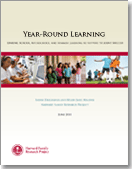The Harvard Family Research Project separated from the Harvard Graduate School of Education to become the Global Family Research Project as of January 1, 2017. It is no longer affiliated with Harvard University.

|
June 2011 Year-Round Learning: Linking School, Afterschool, and Summer Learning to Support Student SuccessSarah Deschenes, Helen Janc Malone |
Article Information
- Full Text (HTML)
- Full Text (PDF: 550 kb)
EXECUTIVE SUMMARY
![]() A 2-page executive summary of Year-Round Learning: Linking School, Afterschool, and Summer Learning to Support Student Success is also available.
A 2-page executive summary of Year-Round Learning: Linking School, Afterschool, and Summer Learning to Support Student Success is also available.
There is growing national discussion about the need to create a more expansive definition of learning to include all the ways that youth can access educational opportunities—not just through the traditional school model, but also through afterschool activities, time spent with the family, and increasingly, through interaction with digital media. Broadening our ideas about where, when, and how learning happens helps communities to create richer learning pathways that have the potential to include more nonacademic opportunities to help youth gain the skills necessary for a healthy adulthood, offer a seamless learning environment that can help stem summer learning loss, and tap resources outside of schools for additional opportunities to help close the achievement gap.
This brief introduces and analyzes one approach to expanded learning that provides students—often in distressed areas—with access to quality learning environments across the year, through what we call year-round learning.
Year-round learning consists of intentional, community-based efforts to connect school, afterschool, and summer learning to support positive youth outcomes, develop continuous learning pathways, and provide equitable opportunities for both students and families.
Year-Round Learning: Linking School, Afterschool, and Summer Learning to Support Student Success, examines the efforts of initiatives that are approaching learning time in new ways and bringing community resources together to provide year-round learning environments. The brief discusses:
- Different configurations of year-round learning
- Common principles used by programs and initiatives doing this work
- Early lessons from these initiatives
- Profiles of six programs and initiatives illustrating themes discussed in this brief
